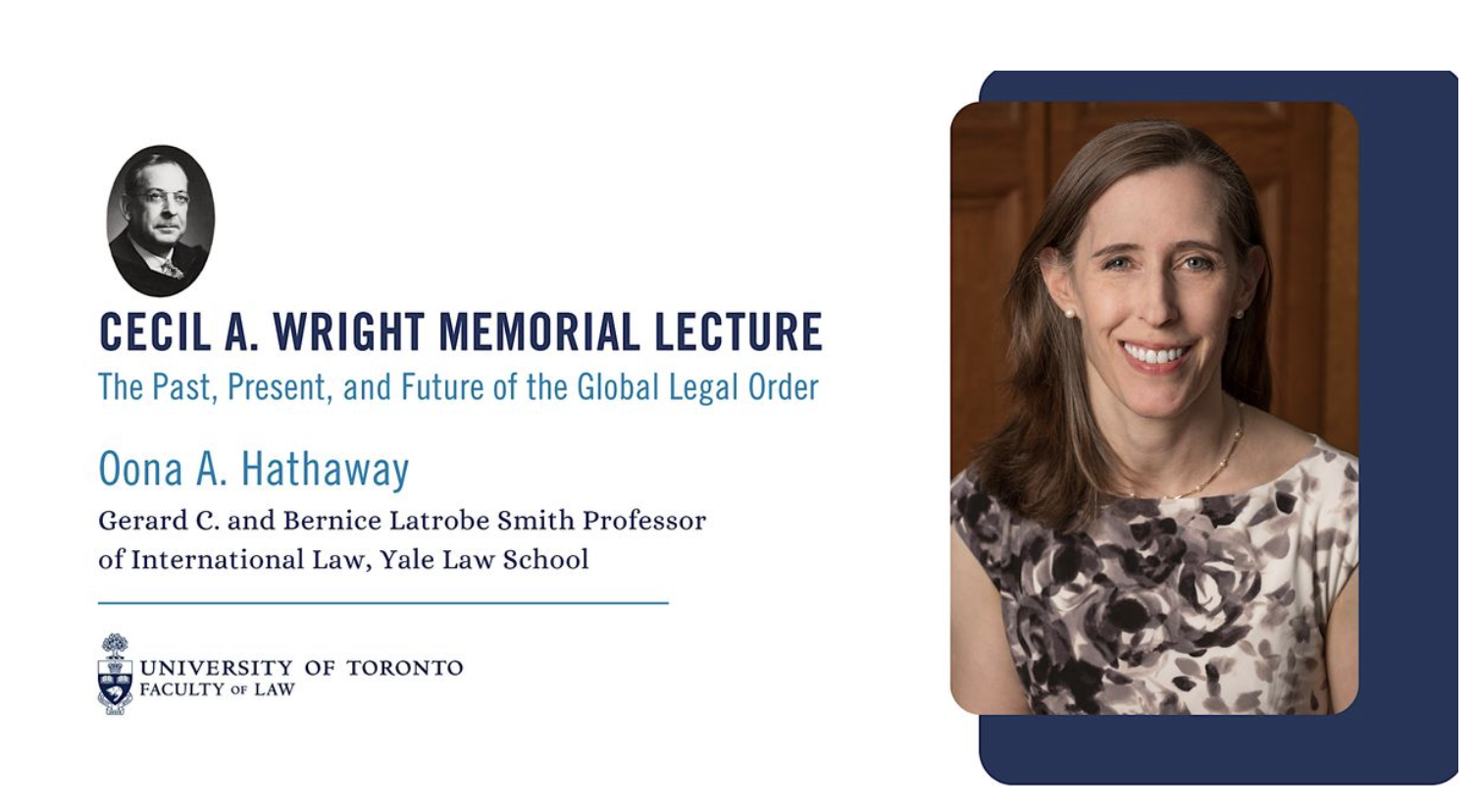Reflections from the 2023 Cecil A. Wright Memorial lecture

This past year, we have witnessed some of the most devastating world conflicts in recent decades. Remaining optimistic has proven difficult. Peace and stability across war-torn regions seem unattainable. The legitimacy of international institutions is currently under siege. Yet, some international legal experts remain hopeful. Professor Oona Hathaway of Yale Law School provided the University of Toronto Faculty of Law community some much-needed optimism during this year’s Cecil A. Wright Memorial Lecture, “The Past, Present, and Future of the Global Legal Order.” Her lecture focussed mainly on the War in Ukraine and its implications, while she recognised the devastating developments in the Israel-Palestine conflict and its rapidly evolving nature.
A Comparison of the Old and the New
To contextualise her discussion about Russia’s invasion of Ukraine, Professor Hathaway provided an overview of the Old and New World Order, which she discusses in depth in her book The Internationalist: How a Radical Plan to Outlaw War Remade the World. The use of force was at the core of the Old World Order, encompassing colonial history until the end of World War I. During this time, war was the legal norm to right wrongs. Professor Hathaway presented research about the top reasons states gave for going to war at the time: self-defence (72 percent), compensation for tortious injuries (42 percent), and enforcing treaty obligations (41 percent). The laws of war meant conquest, gunboat diplomacy, and crimes of aggression were also legal.
The rules governing war drastically changed at the end of World War I with the Kellogg-Briand Pact. The Pact set the groundwork for a New World Order, with the prohibition of force as its central principle. States could no longer legitimately conquer land or declare war against countries that threatened the balance of power. The Pact paved the way for Article 2(4) of the Charter of the United Nations: “All Members shall refrain from the threat or use of force against the territorial integrity or political independence of any state, or in any other manner inconsistent with the Purposes of the UN.”
War in Ukraine – A Threat to the New World Order
Hathaway shared her reflections about the War in Ukraine as the greatest challenge to the New World Order since World War II. The United Nations Security Council (UNSC) has made no resolutions on Russia’s invasion of Ukraine with Russia as a permanent member of the UNSC, prompting even greater criticism of international governance bodies. Russian President Vladimir Putin’s war manifesto is an ode to Old World principles and could only be responded to by New World mechanisms. Hathaway was pleased with the strong global condemnation of Russia’s invasion; 140 states voted in favour of a United Nations General Assembly (UNGA) resolution about Russia’s violation of Article 2(4) of the Charter of the United Nations.
How does the New World respond to violations of international law without the use of war? “Outcasting,” Hathaway said, “denying the disobedient with the benefits of social cooperation and membership.” She coined the term “outcasting” to encompass the elements of an effective response to global aggressors.This is the strategy linked to imposing sanctions and suspending Russia from international bodies, like the Council of Europe. In addition to outcasting, the global community’s support for Ukraine has also proven fundamental in thwarting Russian aggression.
Global Trends – Challenges and Opportunities
The War in Ukraine reveals challenges and opportunities for the international legal order. Outcasting by removing Russia’s access to capital and limiting its ability to engage in international forums has proven effective to counter Russia’s offensive, but pariah countries are working to safeguard Russia from the full effect of this outcasting. More so than ever before, economics and military intervention are intertwined. While Europe and the West have cut back on oil from Russia, India and China have increased their spending on it. At the United Nations, many countries in Africa and Asia have abstained from voting in favour of punishing Russia. Why do these countries think it is not within their self-interest to do so? Hathaway emphasized the importance of understanding the underpinnings of the Global South’s response.
There is a growing concern that the world is moving towards fractionalizing into two. Will the idea of the West versus the rest prevail and shift the world order? Hathaway shared some optimistic reflections. In these times of uncertainty, global leadership is looking towards international institutions to provide a forum for discussion and collective action. Hathaway has noticed a shift of energy towards UNGA with the incapacitation of the UNSC—this encourages countries from the Global North and South to work toward common objectives. Hathaway spoke to the need for the Global South to be valued and included in the discussions that will inevitably shape how the world responds to these threats to peace and stability.
Impact on Global Human Rights
In recent news, Russia’s bid to return to the United Nations Human Rights Council failed, which is a significant win for human rights and the Council’s legitimacy. The International Criminal Court (ICC) received referrals from 39 states prompting an investigation into Russian war crimes, crimes against humanity, or genocide committed in Ukraine. The ICC has also issued arrest warrants for Putin and Maria Lvova-Belova, the Commissioner for Children’s Rights in the Office of the President of the Russian Federation. There are active discussions around creating a new international tribunal to prosecute aggression against Ukraine, which would be a powerful step towards prosecuting human rights violators and promoting greater global accountability. Hathaway notes that the US has finally acknowledged the ICC’s value and positive contributions to maintaining the rules-based international order—a long-awaited recognition that will further legitimize the international legal system.





